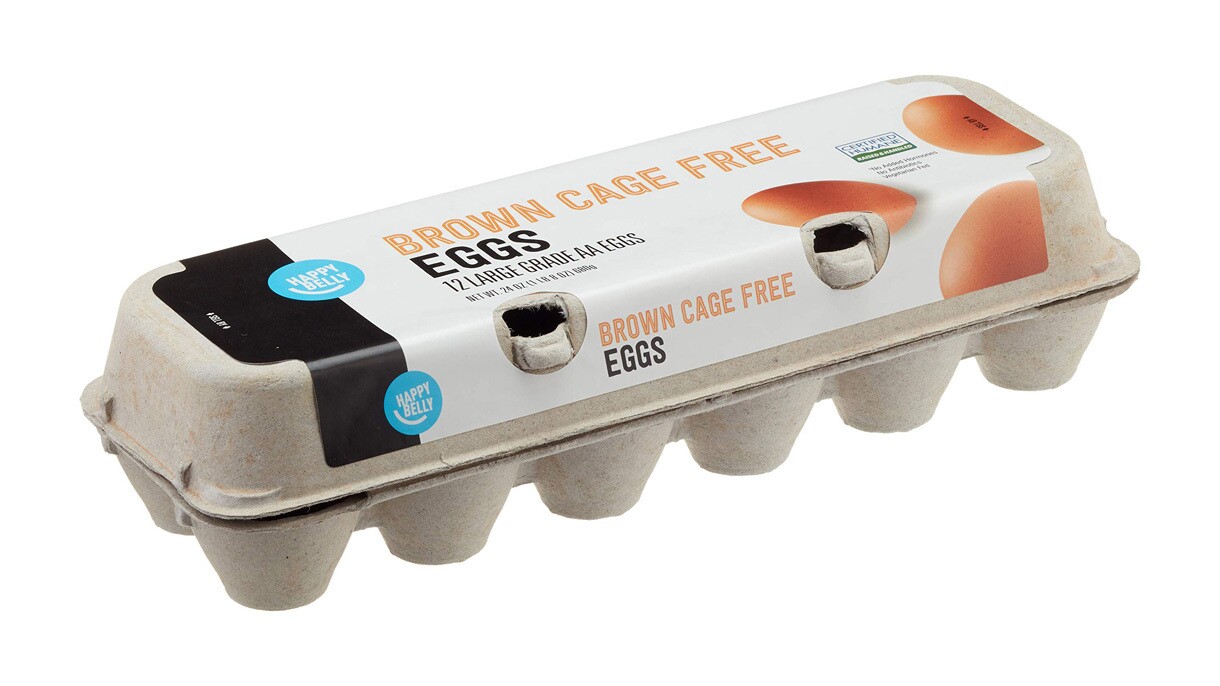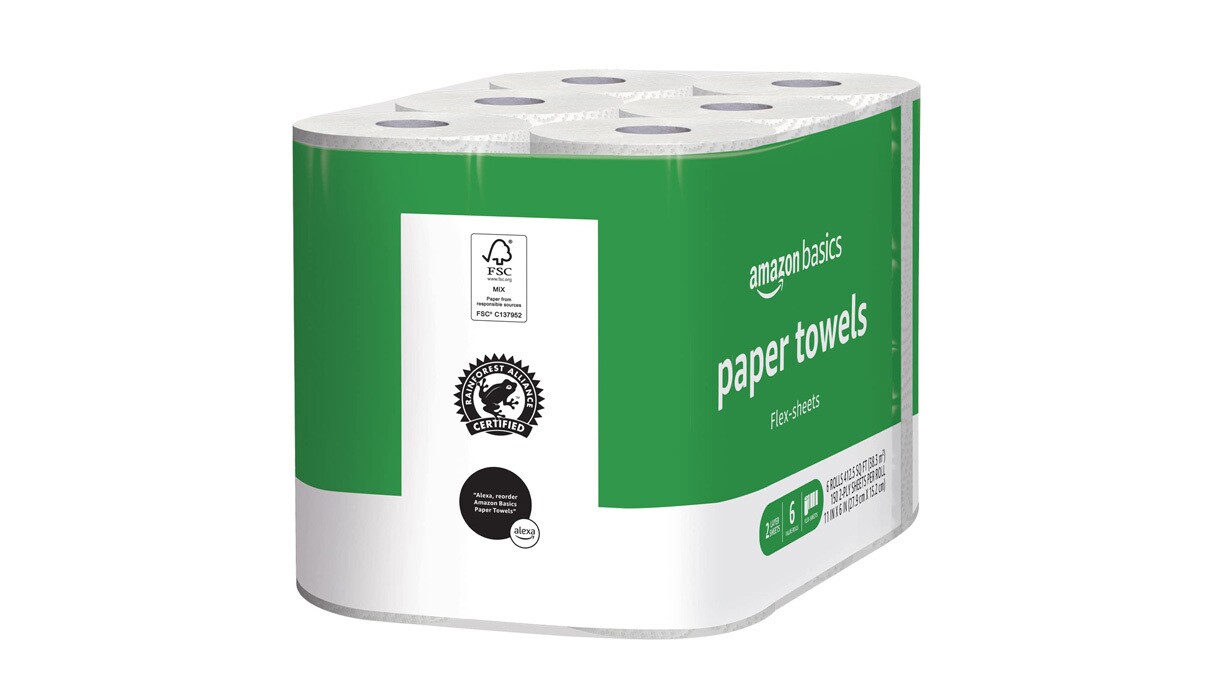As part of our mission to be Earth’s most customer-centric company, we are committed to providing our customers access to quality products—and that starts with the Amazon Private Brands we manufacture and sell. As more customers shop for their groceries at Amazon stores—both physical and online—we want them to know and understand the ingredient sustainability commitments we have set with our suppliers. That’s why we’re sharing information about the commitments we uphold across our Private Brands in our grocery business, including Amazon Fresh, Amazon Kitchen, Amazon Go, and Whole Foods Market.
“We are committed to providing transparency to our customers, along with options to shop more sustainably,” said Jeff Helbling, vice president for Amazon Fresh. “We’ve been diligently working to establish our product sustainability commitments since the launch of our grocery Private Brands, and we are excited to share these publicly with our customers and partners.”
The following commitments guide our decisions for sourcing materials more sustainably for our grocery Private Brands:
Animal welfare

As retailers of animal-derived products, we recognize our responsibility to uphold animal welfare within our supply chain. We expect our suppliers to uphold the Five Freedoms framework for animal welfare, which mandates freedom from hunger and thirst; freedom from discomfort; freedom from pain, injury, or disease; freedom to express normal behavior; and freedom from fear and distress. We expect our suppliers to comply with all applicable laws and to take a zero-tolerance approach to animal cruelty, abuse, and neglect. We encourage suppliers to continuously improve their animal welfare standards and practices, and to work toward recognized animal welfare certifications or industry guidelines that include welfare provisions. For information about animal welfare at Whole Foods Market, see its Meat Department Quality Standards.
Eggs

Amazon is committed to sourcing cage-free eggs in our grocery Private Brands whole shell eggs products in North America and Europe. At Whole Foods Market, all shell and liquid eggs sold in our dairy cases and used in our kitchens and bakeries in the U.S. go beyond cage-free and are audited by one of four production systems to meet Whole Foods Market’s Animal Welfare Standards for Laying Hens. At Whole Foods Market in Canada, all eggs come from cage-free hens.
Pork
In addition to complying with the European restrictions on the use of gestation crates, Amazon is committed to sourcing gestation crate-free pork by 2025 in our grocery Private Brands fresh pork products in North America. At Whole Foods Market, all pork sold in the Meat Department is also crate-free and certified by the Global Animal Partnership—a nonprofit alliance of producers, retailers, animal advocates and scientists—that certifies producers’ animal welfare practices to more than 100 animal welfare standards. See Whole Foods Market’s Meat Department Quality Standards for more information.
Cocoa, coffee, and tea
Amazon is committed to sourcing cocoa, coffee, and tea that is certified against sustainability standards by Rainforest Alliance or Fairtrade International for our grocery Private Brands selection in Europe. For cocoa products in Europe, other independently verified third-party schemes (such as Cocoa Horizons) may also be used, subject to review and approval. Most of our Private Brands ground, whole bean, and pods coffee products in North America are also certified by Rainforest Alliance, Fairtrade International, or Fair Trade USA, and we expect the remaining selection to transition in 2022.
All 365 by Whole Foods Market brand chocolate bars, chocolate chips, and baking chocolate are certified by Fair Trade USA, and in 2021, we transitioned all tea under the same brand to be certified by either Fair Trade USA or Rainforest Alliance. In addition, all 365 by Whole Foods Market packaged coffee is responsibly sourced and certified according to an approved third-party certification, including Rainforest Alliance, Fair Trade USA, or Fairtrade International. Whole Foods Market is also a member of Conservation International’s Sustainable Coffee Challenge, a collaborative effort of companies, governments, NGOs, research institutions, and others to transition the coffee sector to be more sustainable.
Palm oil
Amazon uses palm oil certified against sustainability standards in our Amazon Private Brands food and non-food products in North America and Europe. In a small number of cases, palm oil credits may be used to cover small volumes and complex derivatives. We revisit these cases annually with applicable suppliers and agree on plans to transition to physically certified palm oil where possible. In addition, 100% of 365 by Whole Foods Market brand food items containing palm oil, palm kernel oil, palm fruit oil, and palm shortening are produced using sustainable oil products.
Paper

In North America and Europe, Amazon grocery Private Brands are committed to sourcing paper products such as paper towels, toilet paper, and facial tissue that are certified against sustainability standards or as recycled by organizations such as the Forest Stewardship Council (FSC), Sustainable Forestry Initiative (SFI), and Programme for the Endorsement of Forest Certification (PEFC). In addition, all 365 by Whole Foods Market paper products are either made from 100% recycled materials or certified by FSC.
Seafood
Amazon is committed to sourcing seafood that is certified or rated against sustainability standards for our grocery Private Brands selection in North America and Europe, as well as throughout Whole Foods Market’s Seafood Department. For wild-caught seafood under these selections, single-ingredient fresh, frozen, and canned products must be sourced from fisheries that are certified against sustainability criteria by the Marine Stewardship Council (MSC) Standard or rated “Green” or “Yellow” by Monterey Bay Aquarium Seafood Watch Program. Amazon Private Brands wild-caught seafood products may also be part of a credible fishery improvement program (FIP) with a progress rating of C or higher. For single-ingredient farmed seafood, Amazon grocery Private Brands products must be certified by the Aquaculture Stewardship Council (ASC), certified organic by EU Organic, Naturland, or other approved schemes, or certified 2 stars or higher by the Global Aquaculture Alliance’s Best Aquaculture Practices (BAP). All Whole Foods Market farm-raised fresh or frozen seafood meets its Responsibly Farmed standards, is traceable to the source, and requires third-party verification of water quality and dozens of other quality standards. See Whole Foods Market’s Seafood Department Quality Standards for more information.
Learn More about our Restricted Substance List, which provides an extensive list of chemicals we seek to avoid in Amazon Private Brands across baby, household cleaning, personal care, and beauty products, and applies to all suppliers of these product categories in the U.S. and Europe.
Our Food Contact Materials Restricted Substance List outlines the chemicals of concern and non-recyclable materials we prohibit in Amazon Kitchen food contact packaging.
Quality Standards, which prohibit more than 230 preservatives, flavors, colors, sweeteners, and other ingredients. Whole Foods Market also has standards for all household cleaning, beauty, and body care products.
Trending news and stories










